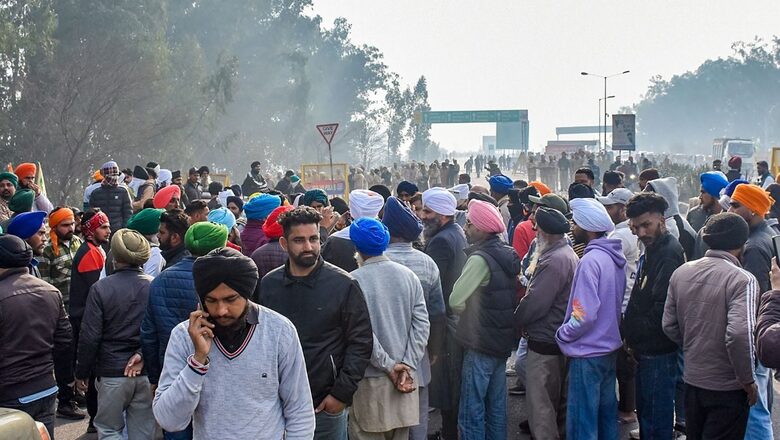
views
A law guaranteeing minimum support price (MSP) for all crops produced in the country, as protesting farmers are demanding, would mean a burden of Rs 40 lakh crore on the exchequer, government calculations show. This is just short of the entire expenditure budget of Rs 45 lakh crore in the upcoming financial year. Such a guarantee just on the presently MSP-mandated crops would itself mean a payout of nearly Rs 10 lakh crore, equivalent to the entire capital expenditure budget of the central government in the forthcoming financial year, government sources have said.
These figures put in perspective why the Centre is not in favour of a law on “guaranteed MSP” as it would upset the entire fiscal balance of the country. Protesting farmers are demanding legislation saying every crop cultivated by them should be open to procurement at MSP by the central government. This is a huge burden as the total value of agricultural produce in India stood at Rs 40 lakh crore in the financial year 2020-21. This includes produce from dairy, farming, horticulture, livestock, and the MSP crops. If one takes just the two dozen MSP crops, the total market value of that agricultural produce stood at Rs 10 lakh crore in 2020-21.
However, the entire MSP crop produced in India is not procured at the minimum support price by the government, as farmers sell it elsewhere too. The Narendra Modi government spent nearly Rs 2.28 lakh crore in 2022-23 to procure food grains at minimum support price, which is about 25 per cent of the total MSP crops produced in the country. This is up nearly 115 per cent from 2014-15 when the government had spent Rs 1.06 lakh crore on buying crops at MSP. In terms of quantity too, MSP-based procurement of food grains has increased from 761.40 lakh metric tonnes in 2014-15 to 1,062.69 lakh metric tonnes in 2022-23, at about 38 per cent, data shows. However, the farmers want more and more.
If an MSP guarantee law were to be brought, the Centre would be looking at an expenditure of at least Rs 10 lakh crore annually, which is almost equivalent to the expenditure of Rs 11.11 lakh crore this government has set aside for capital infrastructure in the recent interim budget. To accede to the bigger demand of the farmers to cover every crop produced in the country under MSP would mean devoting the entire union budget to it. This would put India’s “third-largest economy” target for the next five years into serious jeopardy and expose people to more taxation through direct and indirect taxes, government sources say.
Leaders from the ruling Bharatiya Janata Party feel that the current farmers’ protest is driven by politics and tacit support from the Congress and Aam Aadmi Party ahead of the Lok Sabha elections. The AAP government in Punjab has given a free pass to farmers to reach the borders in Haryana while denying the Centre’s request to convert a stadium in Delhi into a temporary jail. The Congress in a press conference also backed the demands of the farmers. This despite the Centre’s straightforward stand— that it is committed to offering a minimum support price for crops while farmers are free to sell their produce to the government procurement agencies at MSP or in the open market, whichever is advantageous to them.
The MSP for major crops has been steadily rising as well, the government says citing figures. In 2023-24, for paddy, it stands at Rs 2,183 per quintal, up Rs 243 from 2021-22. The MSP for wheat in this financial year stands at Rs 2,275, up Rs 250 from two years ago. The MSP for jowar has risen by Rs 442 over the last two years, by Rs 469 for ragi, and for cotton, the increase has been by Rs 894 to reach Rs 6,620 for every quintal in the present financial year.




















Comments
0 comment